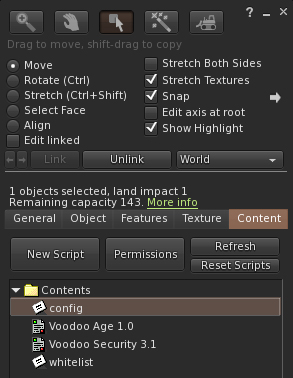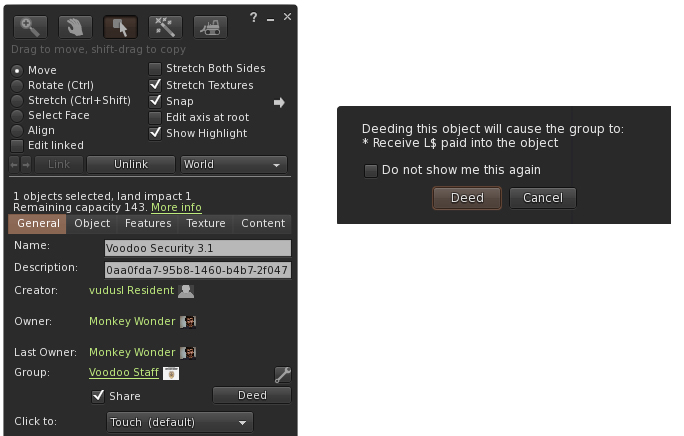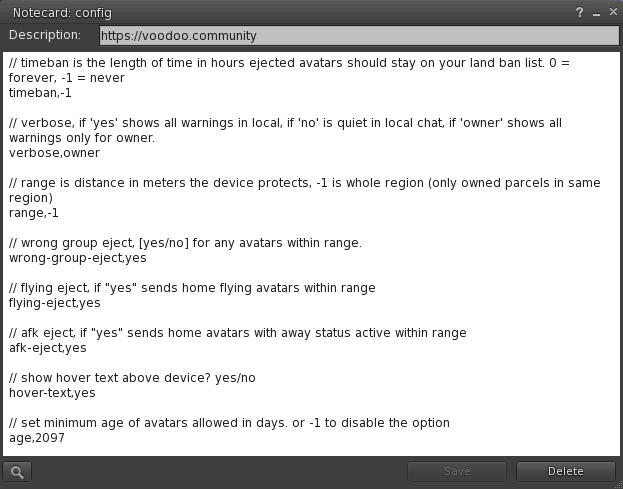Thank you for purchasing or upgrading to Voodoo Security 3.1.
VS 3.1 expands on the stability and reliability of the previous version, by including new useful security features, integrating more deeply into our web systems, and extends new threat analysis, so we can protect you from attacks that haven't even been invented yet.
Features
- Automatic removal of known attackers using our DDOS protected threat database.
- Minimum age restriction to prevent a griefer making new avatars to attack.
- Automatic removal of avatars who appear to be trying to crash the region.
- Optionally remove avatars who are flying, AFK, or have the wrong group active.
- Notifications can be hidden, displayed in local chat, or sent to the VS3 owner.
- White list, to always allow an avatar onto your land.
- Full region scan, but the parcel owner must be the same as the device owner.
- Configurable range setting, to limit the protected area.
- Script and memory usage limiter.
- Excellent customer support, we'll help you through those tough times ;)
Getting Started
When you rez the Voodoo Security device from your inventory, you'll need to configure it to your requirements.
Right click the device, and select "Edit" from the menu.

The config notecard contains all the settings for your security device detailed below.
The whitelist notecard contains a list of avatar keys for friends, who should never be ejected from your land.
Group Owned Land
The owner of the land, must be the same as the owner of the Voodoo Security device to be allowed to eject.
If your land is owned by a group, you must "deed" the VS3 to the same group.
On the General tab in edit, select the land group, tick Share, click the Deed button, and Deed again on the pop-up dialog, as below.

The Config Notecard

All the configuration is made up of settings, each one has a name and a value, and is seperated by a comma.
The lines beginning with // are just help tips, and can be safely removed if required.
timeban
This specifies how you would like to handle known attackers on your land ban list.
The value must be a number, possible values are:
-1 - Never add known attackers to the land ban list.
0 - Add known attackers to the land ban list forever.
Positive number - Add known attackers to the land ban list for the specified number of hours.
The maximum number of hours an avatar can be banned (if not permanently) is 144 hours (6 days), according to the LSL Wiki.
verbose
This specifies how you would like to be notified when an avatar is ejected by your security device.
Possible values are:
yes - The security device will announce in local chat when an avatar is ejected.
no - The security device will remain silent.
owner - The security device will send a private message to the owner when an avatar is ejected.
range
This optionally specifies the radius your security device protects, and is useful if you want to limit coverage.
Possible values are:
-1 - The security device won't limit it's range.
Positive number - The distance in meters to protect.
wrong-group-eject
This specifies if you would like to eject avatars with a different active group than the security device.
Possible values are:
yes - Avatars with a different active group will be ejected.
no - Active group is not taken into consideration.
flying-eject
This specifies if you would like to eject avatars who are flying.
Possible values are:
yes - Avatars who are flying will be ejected.
no - Flying avatars are not taken into consideration.
afk-eject
This specifies if you would like to eject avatars who are in "Away" status.
Possible values are:
yes - Avatars who are AFK will be ejected.
no - AFK avatars are not taken into consideration.
hover-text
This specifies if you would like your security device to display hover text about it's status.
Possible values are:
yes - The status of the VS will be shown in green or red above the device.
no - No hover text will be shown.
age
This specifies if you would like to optionally eject avatars below a certain age, and can be used if an attacker makes new avatars after they've been banned.
Possible values are:
-1 - Allow avatars of any age on protected land.
Number above zero - Avatars below this age in days will be ejected.
The maximum value is 365.
Frequently asked questions
---------------------------------
Can I see peoples IP address and their alt avatars?
A: No, Voodoo doesn't disclose any information other than informing in local chat when an avatar is ejected.
How many devices do I need to protect an entire region?
A: The device covers a region, but the parcel owner must be the same as the device owner.


